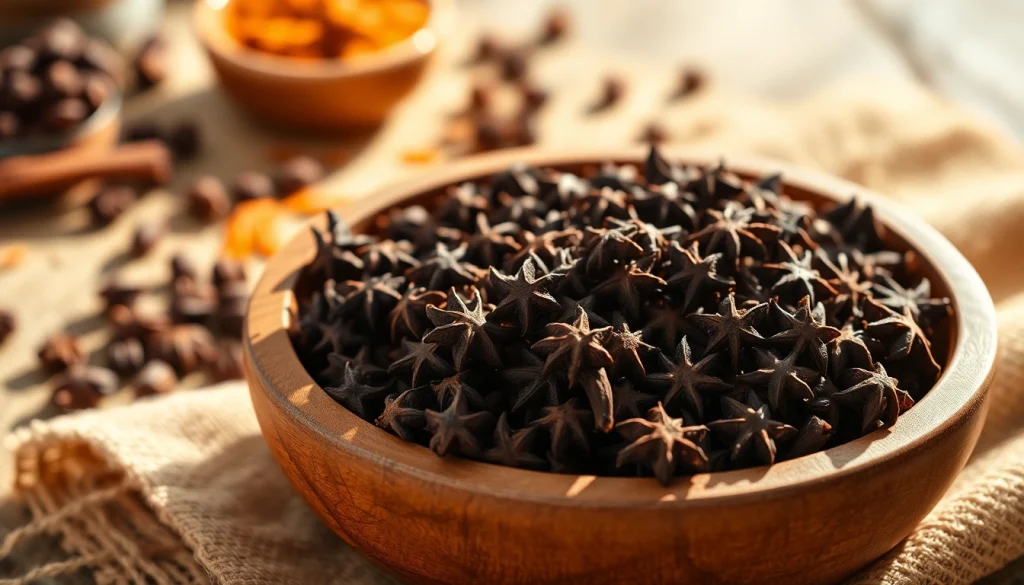Cloves: The Aromatic Spice with Powerful Health Benefits and Culinary Uses

Main Characteristics of Cloves
What Are Cloves?
Cloves are the aromatic flower buds of the Syzygium aromaticum tree, part of the Myrtaceae family. Native to the Maluku Islands in Indonesia, these small, reddish-brown buds are widely recognized not only for their distinctive flavor but also for their numerous health benefits. Cloves are harvested when they are still immature, then dried to be transformed into the spice we know and love. Today, they are essential components in various culinary traditions and medicinal applications across the globe.
Beyond their culinary uses, cloves play a significant role in the fragrance and cosmetic industries due to their rich, warm scent. With a peak harvest season usually from September to December, cloves not only enhance flavors in food but have been revered for centuries for their therapeutic properties.
Culinary Flavor Profile of Cloves
The flavor of cloves is complex and multifaceted, often described as sweet, spicy, and slightly bitter. They have a pungent aroma that can dominate other flavors, making them a powerful ingredient in cooking. The primary volatile oil in cloves, eugenol, contributes to their distinctive taste and has antiseptic properties, which is why they are commonly used in both cooking and traditional medicine. In sweet dishes like gingerbread and pumpkin pie, their warmth complements the richness of other spices such as cinnamon and nutmeg. In savory dishes, cloves can add depth, particularly in stews, marinades, and even grilled meats.
Popular Varieties of Cloves
Two main types of cloves are commonly available in markets: Indonesian and Indian cloves. Indonesian cloves are often larger and have a higher eugenol content, making them popular in both culinary and aromatic uses. Indian cloves are usually more pungent and are primarily used for flavoring foods and beverages. Another notable variety is the Zanzibar clove, known for its distinct taste and is often prized for culinary purposes. Each variety carries unique characteristics that can influence a dish’s final flavor profile.
Health Benefits of Cloves
Antioxidant Properties of Cloves
Cloves are rich in antioxidants, which help combat oxidative stress in the body. They contain compounds such as eugenol and flavonoids that scavenge free radicals, potentially reducing the risk of chronic diseases such as cancer and heart disease. Studies have shown that the antioxidant potency of cloves is significantly higher than that of many other spices, making them an exceptional addition to a healthful diet.
Cloves and Digestive Health
In traditional medicine, cloves have been used to aid digestion for centuries. The extracts from cloves have demonstrated the ability to stimulate the production of digestive enzymes, which can enhance the metabolism of food. Furthermore, studies indicate that cloves may assist in relieving digestive issues such as bloating, gas, and gastric discomfort. Incorporating cloves into meals can thus provide a dual benefit of flavor and digestive support.
Cloves for Oral Care
The antiseptic and analgesic properties of cloves make them a popular natural remedy for oral health. Clove oil is commonly used for toothaches because eugenol has numbing properties that can alleviate pain. Additionally, cloves can promote overall oral hygiene by combating bad breath and reducing inflammation in gums. Many dental products, including toothpaste and mouthwash, leverage these beneficial properties to provide a natural alternative to chemical-laden counterparts.
Using Cloves in Cooking
Classic Recipes Featuring Cloves
Cloves are often featured in many traditional dishes from various cuisines around the world. In Indian cooking, for instance, they are an essential ingredient in garam masala, adding warmth and complexity to curries. In Western cuisine, cloves are frequently found in holiday recipes, such as spiced ham, mulled wine, and fruitcake. Their versatility is unmatched, easily transitioning from savory main dishes to sweet desserts, enhancing both flavor and aroma.
Tips for Incorporating Cloves into Meals
When using cloves in cooking, whole cloves can be used to infuse dishes, while ground cloves are better for baking. It’s essential to use cloves sparingly since their potent flavor can easily overpower other ingredients. For a delightful addition, consider pairing cloves with citrus flavors, as the warmth of cloves can effectively balance the brightness of fruits like orange and lemon. Always remember to remove whole cloves from a dish before serving, as they can be tough and unpleasant to bite into.
Pairing Cloves with Other Spices
Cloves’ unique flavor profile pairs wonderfully with several other spices, elevating a dish’s complexity. They work well with sweet spices like cinnamon and nutmeg, making them excellent for holiday desserts. On the savory side, cloves can be combined with cardamom, cumin, and black pepper to create spiced blends that enhance meats and legumes. Experimenting with different spice combinations can lead to discovering new favorite recipes.
Clove Essential Oil and Its Uses
Health Benefits of Clove Oil
Clove essential oil is extracted from the buds and stems of the clove tree and is known for its potent health benefits. Beyond its use in cooking, clove oil is often employed for its anti-inflammatory and analgesic properties. It’s commonly used in topical applications for muscle pain relief and to aid in wound healing. Additionally, its natural antiseptic qualities make it effective in treating minor injuries and skin irritations.
Ways to Use Clove Oil Safely
While clove oil provides several health benefits, it is essential to use it safely. Always dilute it with a carrier oil before applying it to the skin to prevent irritation. A common practice is to mix a few drops of clove oil with coconut or olive oil, which can then be gently massaged into the affected area. Additionally, using clove oil in a diffuser can promote relaxation and boost concentration due to its aromatic properties. However, pregnant women and children should use clove oil under medical supervision.
Clove Oil in Aromatherapy
In aromatherapy, clove oil is valued for its warm and spicy fragrance, believed to enhance mood and stimulate mental clarity. When diffused, it can create a comforting atmosphere and alleviate feelings of anxiety or stress. Additionally, the antimicrobial properties of clove oil make it an excellent choice for purification in stressful environments, such as homes or offices, where air quality may be a concern. Incorporating clove oil into your daily routine can thus offer both emotional and physical benefits.
Finding and Storing Quality Cloves
Where to Buy Cloves
When shopping for cloves, consider purchasing from reputable sources to ensure quality. Organic cloves are often recommended due to their absence of harmful pesticides. Specialty spice shops, health food stores, and online retailers tend to offer a variety of cloves, including whole and ground forms. Whichever option you choose, it’s vital to check for freshness and potency, as older spices tend to lose their flavor and health benefits.
How to Store Cloves for Longevity
Proper storage is critical for maintaining the freshness and potency of cloves. Whole cloves should be kept in an airtight container in a cool, dark place, away from heat sources and moisture. Ground cloves have a shorter shelf life and are best stored in the refrigerator or freezer if not used regularly. It is advisable to buy cloves in small amounts to ensure maximum flavor and effectiveness, and they should ideally be used within six months of opening.
Identifying High-Quality Cloves
To identify high-quality cloves, look for those that are dark brown, plump, and have a strong, aromatic scent. Fresh cloves will retain their distinctive fragrance when crushed. Avoid any cloves that appear dusty or show signs of mold, as these indicate poor quality. When purchasing ground cloves, opt for those sold in sealed packages to prevent contamination and ensure freshness.







